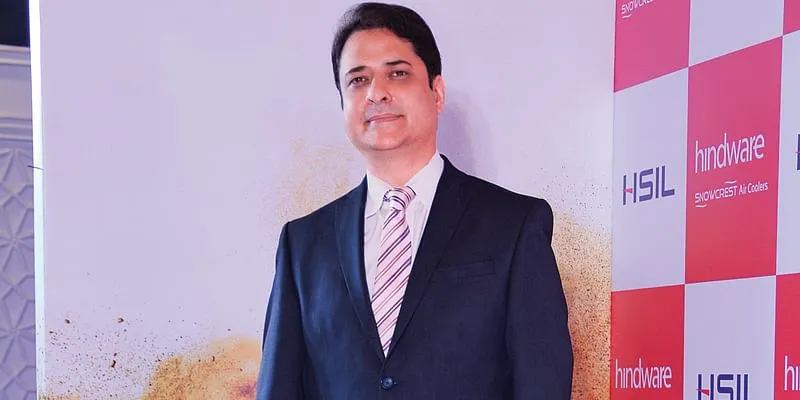Not just sanitary ware, here’s how Hindware demerged to expand into consumer appliances, home, and kitchen; raking in Rs 1,600 Cr revenue
Home to six-decade-old iconic brand Hindware, Somany Home Innovation Limited (SHIL) houses a range of products under consumer appliances, home retail solutions, and furniture and kitchen fittings business. Listed on both BSE and NSE, the company raked in Rs 1613.12 crore revenue in FY20.
If you are asked to name a sanitary ware brand, what’s the first name that comes to your mind? For many Indian consumers, Hindware is the first brand they can recall. One of the leading brands in the sanitary ware category competing with the likes of Jaguar, Kohler India, Parryware, among others; Hindware holds a long history of inception, acquisitions, expansions, and one of the biggest demergers.
The roots of the brand go back to 1960 when Dr RK Somany moved from Kolkata to Delhi to set up a business in the sanitary ware industry. After conducting thorough research, he found that the Indian market does not cater to vitreous china sanitaryware and thus, thought to fill this gap.
Through technological collaboration with Twyfords, UK, Dr Somany founded Hindusthan Twyfords Limited to introduce the Chinese tiles to India and set up the first manufacturing plant in Bahadurgarh, Haryana.
In 1969, the company was renamed to Hindustan Sanitaryware and Industries Limited (HSIL), after which in 1981, it expanded the business to manufacture glass.
Over time, HSIL expanded its manufacturing capacity and product portfolio. It introduced the brand Hindware in 1991 and ventured into a range of industries — from dealing with pipes, bathroom fittings, water conservation products, faucets, home interior fashion, kitchen appliances, and other consumer appliances category. Over the next two decades, HSIL had many tie-ups with foreign companies and acquisitions.
However, in 2017, Hindware demerged and ventured into consumer products space through kitchen and home appliances products to form Somany Home Innovation Limited (SHIL), which is now known as one of India’s leading home appliances companies.
Listed on both the National Stock Exchange (NSE) and Bombay Stock Exchange (BSE), the Gurugram-based company houses a range of products under consumer appliances, home retail solutions, and furniture and kitchen fittings business. Within three years of demerger, SHIL now rakes an annual revenue of Rs 1,613.12 crore.
In an interaction with SMBStory, Rakesh Kaul, CEO and Whole Time Director of SHIL talks about how the company expanded its product portfolio after the demerger, it’s market share, and why it opted to foray into some of the leading tech-enabled products.
Seizing the consumer appliances market
The demerger in 2017 lead to formation of three companies — Somany Home Innovation Limited (SHIL), to cater to the marketing and distribution of consumer products division and retail division; Brilloca Limited, a subsidiary of SHIL, for the marketing and distribution of the Building Products division; and HSIL, the manufacturing of Building Products and marketing and distribution of Packaging Products division.
Home to the iconic brand Hindware, SHIL’s focus on R&D activities has helped the company to enhance its capacity to conceive innovative ideas and apply for over 26 patents since its inception.
The consumer appliances portfolio of SHIL consists of brands such as Hindware kitchen ensemble (cooker hoods, built-in hobs, cooktops, built-in ovens, and sinks), Hindware Atlantic water heaters, Moonbow by Hindware air purifiers and water purifiers, Hindware Snowcrest air coolers, and ceiling fans.
Rakesh tells SMBStory that most of the products are manufactured on contractual basis. Some of the products, such as the water heater and air cooler, are also manufactured through third-party MSME contract manufacturers that are present locally. For kitchen appliances and furniture space, 50 percent of SHIL products are imported from Malaysia, China, and Turkey.
Over the years, SHIL has created a robust distribution network of over 9,250 retailers, 700 distributor partners, and 800 modern and large retail outlets. The range of Hindware appliances is also available on ecommerce giants like , , etc.
Recently, SHIL also forayed into the kitchen and furniture fittings segment through a strategic partnership with Formenti and Giovenzana Group (FGV), an Italian brand. The collaboration enables the company to distribute a wide range of quality and functional hardware products in India for the modern furniture and modular kitchens segment — such as normal and soft close hinges, side and bottom mounted drawer channels, and drawer systems. The company also collaborated with one of Europe’s top brands ‘Groupe Atlantic’ for the heating solutions segment.

Rakesh Kaul, CEO and Whole Time Director, SHIL
Tech is the ‘new cool’
Going digital has been the key turning point in the new normal as most businesses are finding a way to enhance their digital capabilities. In order to meet the online demand for furniture and home decor, Rakesh says SHIL launched its ecommerce chain Evok to offer a range of products across categories such as wall fashion, modular kitchen, and wardrobes.
Primarily, Evok has presence across the country through 17 franchisee stores and two company-owned stores. Its online portal marketplace caters to Indian small businesses and MSME sellers of furniture.
“Through Evok, not only are we capturing the online space but also leveraging MSMEs to make use of digitisation and step up from their conventional mode of selling, which has been the key learning in the pandemic. The current reach is across 6,600 pin codes in India,” Rakesh says.
SHIL also strengthened its initiatives to provide futuristic devices and solutions, and in FY 2019-20, it launched tech-enabled products like iPro IoT range that includes one of India’s first-ever IoT-enabled chimney, water purifier, water heater, and air purifier.
“The pandemic is a sort of inflection point for the ecommerce industry in India as more consumers are now willing to shop online, Rakesh explains and that the focus of SHIL is now on offering automation enabled appliances that are designed to simplify the lives of consumers and increase online presence of SHIL’s products.”
The company plans to invest Rs 100-125 crore over the next three to five years into brand building, new product development, R&D, etc.
Market size and competition
SHIL operates in various consumer segments such as kitchen appliances, which had an estimated market size of Rs 1,945 crore in FY20 for the organised sector. This includes chimneys, cooking tops, built-in hobs, built-in ovens, etc.
“Hindware holds 18 percent of the market space in overall chimney business, and is among the top two players overall. However, in the ecommerce business, Hindware Kitchen appliances is leading with 40 percent of the market share,” he adds.
On the water heaters front, Rakesh describes that Hindware Atlantic holds 7.3 percent overall market space, with a growth of over 70 percent in trade over last year. In ecommerce, Hindware Atlantic owns 12.3 percent market space and is among the top three players.
In the air coolers business, Rakesh says that Hindware owns 6.7 percent of the overall market, and has grown by over 55 percent in trade during H1 FY 20-21 as compared to last year, with North India being the strongest market, followed by South India. The ecommerce business in air coolers also holds 16 percent of the market share (H1, FY 20-21) and is among the top three air cooler brands being sold online.
With many big and leading players in the consumer products market in India, SHIL competes against not only Indian players but also global players, that led the company to tie up with international brands to boost its tech-based product portfolio.
The way ahead
Talking about the future plans, Rakesh says that SHIL is harnessing the power of Information Technology to drive better business integration. It plans to focus on expanding its presence in the emerging cities and maintain a robust position in the existing ones.
Hindware Appliances is also entering into newer product categories like home disinfecting products, fruits and vegetable cleaners etc. Apart from these, Rakesh says that aggressive efforts are being made by the R&D team towards ‘Hindware Connected Homes’ through technology.
Edited by Kanishk Singh









